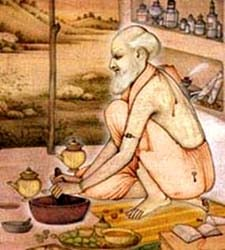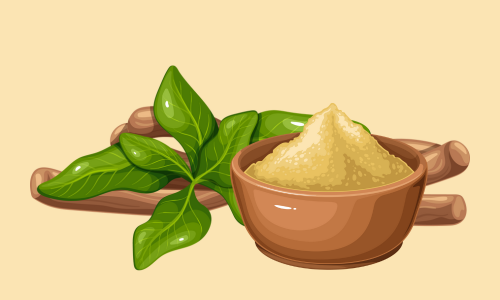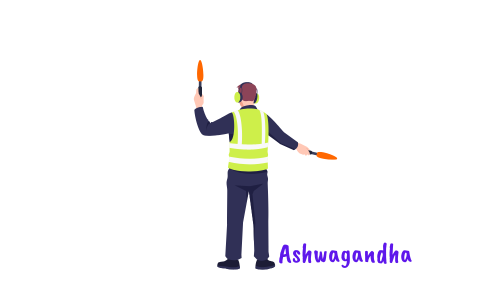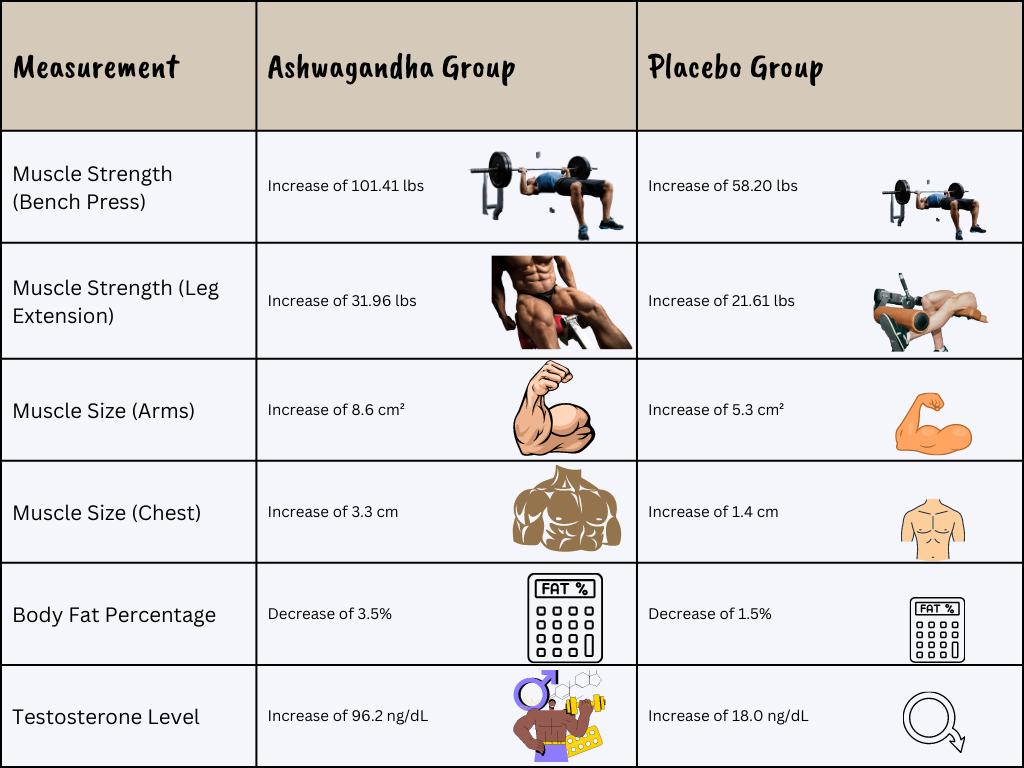
Shrouded in the mists of time and the lush landscapes of ancient India, a potent root has survived the test of centuries: Ashwagandha(withania somnifera). This isn’t your average botanical celebrity of the wellness world. Far from it. This powerful plant, respected by herbalists and validated by science, has a tale to tell, a story stitched together with rigorous studies, ancient wisdom, and compelling evidence. Considered a cornerstone of Ayurvedic medicine for over 6,000 years, Ashwagandha’s secret lies deep within its roots, holding potent properties that have been transforming lives long before modern science began to catch up. In this exploration, we’re about to unravel the power of Ashwagandha, diving into the depths of what makes this root not just potent, but scientifically remarkable.
Ashwagandha: A Journey Through the Sands of Time
Tracing the historical footsteps of Ashwagandha takes us back over 6000 years to the ancient civilization of India. This resilient plant, known scientifically as Withania somnifera, was first discovered thriving in the arid regions of the Middle East and India. Its name, Ashwagandha, translates to “smell of a horse” in Sanskrit, hinting at its unique aroma and ability to impart strength.

The ancient practitioners of Ayurveda, one of the world’s oldest holistic healing systems, quickly recognized the plant’s medicinal potential. Writings dating back to 6000 BC document its use in Ayurvedic medicine, where the root was harnessed for its restorative and rejuvenating properties. Over time, this powerful plant found its way across continents and cultures, while its root remained the source of its potency, leading us to the extensive use we see in herbal medicine in today’s health and wellness world.
The Biomechanics of Ashwagandha
Alright ,so before we get into the specifics of how Ashwagandha root works I want to talk about “phytochemicals” first! Phytochemicals are naturally occurring compounds that provide plants with color, odor, flavor, and more importantly, act as their defense mechanism against environmental threats such as pests, fungi, or harsh weather conditions. Imagine these as a plant’s personal SWAT team, always ready to protect their homeland from harm.

Think about it in the same way our immune system works to protect us, our bodies’ version of a SWAT team. In an interesting twist of nature, these plant protectors have also been found to have beneficial effects on human mental health too.
A great example is salicin, a phytochemical found in willow bark. Salicin is a powerhouse anti-inflammatory and pain reliever and is actually the precursor to the active ingredient in Aspirin. It’s fascinating how a compound designed to protect a tree can have a similar protective effect on us.
So, how does this apply to Ashwagandha? Well, this rugged plant is a native of the dry regions of India, the Middle East, and Northern Africa, areas known for their harsh, arid conditions. To survive, Ashwagandha has had to become a sort of plant warrior, developing its own suite of protective phytochemicals, including a group called withanolides, that help it to survive and thrive in its challenging environment.
Interestingly, the very characteristics that make Ashwagandha resilient to environmental stresses also allow it to confer resilience on those who consume it. Just as Ashwagandha’s phytochemicals help it to adapt to harsh conditions, they also enhance our body’s ability to adapt to stressful situations, which is why Ashwagandha is classified as an ‘adaptogen’.
Now that we’ve understood the concept of phytochemicals and adaptogens, and the role they play in making Ashwagandha the warrior plant it is, let’s delve deeper into what makes it a veritable treasure chest of health benefits for us. We’ll reveal how this alpha plant’s struggle for survival translates into an amazing adaptogenic arsenal for human health.
Ashwagandha a True Alpha Root

What sets Ashwagandha apart is its extraordinary biochemical toolkit, overflowing with an unordinary array of phytochemicals, predominantly the steroid compounds called withanolides. These naturally existing substances are the key players in the plant’s remarkable resilience and adaptability to its challenging environment.
Stress Tolerance: Withanolides contribute to Ashwagandha’s ability to endure environmental stresses, such as drought, high salinity, and extreme temperatures. They help regulate the plant’s physiological processes and trigger protective responses when exposed to these adverse conditions.
Pest and Pathogen Defense: As a deterrent against harmful pests and microorganisms, withanolides exhibit antimicrobial, antifungal, and insecticidal properties. This attribute provides Ashwagandha with a natural line of defense against potential threats, lessening its vulnerability to diseases and infestations.
Competitive Edge: Some studies suggest that withanolides may inhibit the growth of other plants around Ashwagandha, reducing competition for vital resources like water, sunlight, and nutrients—a mechanism known as allelopathy.
These phytochemicals give Ashwagandha a distinct survival advantage, equipping it to flourish in conditions that are typically adverse for plant growth.
When we ingest Ashwagandha, it’s as if we’re absorbing a piece of the plant’s endurance, its robust spirit of survival. It’s a nearly magical energy exchange that goes beyond the realm of simple nutrition, entering the territory of ancient, shared wisdom. The plant’s hardiness infuses us, offering us its own form of armor against the stressors and challenges we face in our modern lives.
5 Major Health Benefits of Ashwagandha
Ancient wisdom meets modern science as researchers unravel the profound health benefits of Ashwagandha. Here are five key benefits, along with the scientific mechanisms behind them:
Stress and Anxiety Reduction
Ashwagandha is a known adaptogen, which means it helps your body handle stress more effectively. When under stress, the body’s cortisol levels rise. This can lead to an array of health issues including sleep problems, mood swings, weight gain, and more. Studies have found that the withanolides in Ashwagandha can help to lower cortisol levels, reducing the effects of stress and anxiety.
Ashwagandha and Stress: The Perfect ‘Nap Time’ for Life’s Annoying Chaos
Imagine this: Your home is filled with high-spirited little brats running around, each one demanding attention, creating a ruckus. That can feel just like what stress and anxiety do to our bodies. Our stress hormone, cortisol, is like those energetic kids, stirring up a commotion that leaves us feeling overwhelmed and on edge.

Now, think of Ashwagandha as the soothing nap time that gently silences the noise, restoring a sense of peace and calm. Ashwagandha, brimming with powerful withanolides, works much like this ‘nap time’ on our body’s stress responses, acting as a calming agent for our internal hullabaloo to reduce stress itself.

Scientifically speaking, these withanolides interact with our Hypothalamic-Pituitary-Adrenal (HPA) axis, the body’s ‘noise control’, effectively reducing the ‘volume’ of cortisol ‘shouts’. The result? A quieter, more serene internal environment where stress and anxiety levels are significantly diminished, akin to a peaceful, napping household.
One significant study published in the Indian Journal of Psychological Medicine featured randomized controlled trial of 64 subjects with a history of chronic stress. Over a 60-day period, the group receiving a 300mg capsule of high-concentration full-spectrum Ashwagandha root extract exhibited a significant reduction in stress-assessment scores when compared to the placebo group.
So next time life’s little disturbances seem overwhelming, remember Ashwagandha. It’s your personal ‘nap time’, turning down the chaos and noise of cortisol, leaving you feeling more balanced and composed. An ancient solution with a modern twist, helping to maintain tranquillity amidst life’s ‘domestic’ uproar.
Enhanced Cognitive Function
Ever felt mentally sharper and more focused after taking Ashwagandha? There’s a scientific reason behind that. This potent root can promote the growth of axons and dendrites, integral parts of the brain’s neurons. The result?Enhanced cognition, memory, and learning capabilities. Here’s how:
Ashwagandha and Cognitive Function: The Brain’s Personal Traffic Controller
Let’s imagine your brain as a vast, bustling city with countless roads and highways. These paths are used by information-carrying vehicles that keep the city functioning smoothly. In this bustling city, the neurons are like the roads, axons are the highways, and dendrites are the off-ramps, directing the flow of information to the correct locations.

When the city (your brain) gets busy or crowded, the traffic (information) can get jammed, leading to slower communication and inefficiencies. This is where Ashwagandha steps in as a personal city planner or traffic controller, optimizing the flow of vehicles (information) and ensuring the city remains at peak efficiency.

Scientifically, Ashwagandha’s potent phytochemicals are thought to promote the growth and repair of axons and dendrites, the brain’s highways and off-ramps. This means more paths for information to travel, leading to faster, more efficient brain communication. It’s like adding more lanes to our highways or building new off-ramps in our city. This results in enhanced cognitive function, improved memory, and better learning capabilities.
One notable study, published in the Journal of Dietary Supplements, tested the cognitive effects of Ashwagandha on 130 healthy adults, over 90 consecutive days. Participants were given 300 mg of Ashwagandha root extract twice daily, or a placebo. The group receiving Ashwagandha showed significant improvements in memory, executive function, attention, and information processing speed when compared to the placebo group.
Another study published in “Phytotherapy Research” demonstrated that Ashwagandha might be beneficial in improving memory and cognitive dysfunction in people with mild cognitive impairment. Participants who took Ashwagandha extract scored better on cognitive function tests compared to those who took a placebo.
Ashwagandha is like a turbo boost for your brain. It helps your neurons grow and repair, making your brain and nervous system‘s information highway faster and more efficient. The result? You think quicker, remember more, and learn better. Studies back this up, showing that folks taking Ashwagandha outperformed those on a placebo in memory and cognitive tests. So, if you’re looking to level up your brain game, you might want to check it out.
Immune Boost
Withanolides in Ashwagandha can stimulate the activity of immune cells like lymphocytes, which fight off pathogens in our body. By boosting these cells, our immune response gets an overall lift, making us more resistant to illnesses.
Consider your immune system like a fortified castle. It’s armed and ready with soldiers (white blood cells or lymphocytes) to defend against invading armies (pathogens like bacteria or viruses). In normal health conditions though, your castle’s defenses are robust, but occasionally, the soldiers may need a boost, especially when they’re up against a particularly tough enemy.

This is where Ashwagandha comes in – think of it as the legendary reinforcement force, or perhaps a secret weapon. The withanolides in Ashwagandha are like a special potion that strengthens your soldiers. They boost the number and activity of these soldiers, increasing their efficiency in fighting off the invading enemies.
Moreover, they stimulate the production of natural killer cells – the elite special forces within your army. These elite forces are highly effective at identifying and eliminating invading armies, reinforcing your castle’s defenses.
A study was published in the Journal of Clinical Medicine in 2021. This study found that Ashwagandha extract significantly improved the immune profile of healthy subjects by modulating the innate and adaptive immune systems. The study suggests that boosting the immune system of people at risk of infection and during widespread infections can be targeted with Ashwagandha extract.
To put it in a nutshell, the withanolides in Ashwagandha supercharge your immune system, enhancing your body’s natural defenses and helping you resist illnesses. Now that’s some reinforcement force you want on your side!
Antioxidant and Anti-Inflammatory Properties
Ashwagandha is a natural anti-inflammatory due to its withanolides which can inhibit the activity of molecules that cause inflammation. Additionally, it’s rich in antioxidants that protect against cell damage caused by free radicals.

Imagine your body as a soccer team, and inflammation is like an overly aggressive rival team. While a bit of physicality is part of the sport, too much can lead to foul play and potential injuries. Here, the withanolides in Ashwagandha act like the referees on the field. They step in to regulate the game, curb the overly aggressive play (inflammation), and maintain the fairness and safety of the game.
Now, the free radicals are like a bunch of crazy fans who’ve managed to break past security and are storming onto the field, wreaking havoc, and disrupting the match. But, it’s all good! Ashwagandha’s antioxidants come into play like the security team. They quickly corral the unruly fans (free radicals), escorting them off the field and preventing any further disturbance.

I found a study titled “A Prospective, Randomized Double-Blind, Placebo-Controlled Study of Safety and Efficacy of a High-Concentration Full-Spectrum Extract of Ashwagandha Root in Reducing Stress and Anxiety in Adults” published in the Indian Journal of Psychological Medicine. While the primary focus of this study was on stress and anxiety, it also mentioned the antioxidant and anti-inflammatory properties of Ashwagandha. However, the study did not directly link these properties to the observed effects on stress and anxiety. rewrite this less formal easy to read and to the point please.
So, with Ashwagandha on your team, you have the diligent referees and security staff you need to keep the match running smoothly and your team playing effectively. However, remember that every team needs a good coach, so it’s always recommended to consult a healthcare professional before starting any new supplement like Ashwagandha.
Improved Strength and Stamina
Feeling more energetic and strong? That’s the Ashwagandha working! Studies have found that this super-root enhances cardiorespiratory endurance, making it a popular choice among athletes.
Let’s break down how Ashwagandha could potentially boost your strength and stamina.
Picture your body as a machine, let’s say a car. In a car, fuel is converted into energy to run the engine, and the efficiency of this process influences how far and how fast the car can go. Similarly, in our bodies, we have a process called “cellular respiration” where the food we eat is converted into a form of energy our cells can use.
Now, research suggests that Ashwagandha might help optimize this process, much like adding a turbo boost to our car. By improving our body’s “fuel efficiency,” it could potentially enhance our physical performance, allowing us to work out harder and longer before tiring. This leads to gains in both strength and stamina.

Furthermore, some studies suggest that Ashwagandha might reduce perceived exertion—our sense of how hard we feel we’re working. So, not only might the plant help you do more, but it could make it feel easier as well. It’s like having a top-tier mechanic fine-tuning your engine to make sure everything’s running as smoothly and efficiently as possible. Now don’t take my word for it without some research.
The study published in the Journal of the International Society of Sports Nutrition in 2015. Titled “Examining the effect of Withania somnifera supplementation on muscle strength and recovery: a randomized controlled trial” was conducted to examine the effects of ashwagandha root extract consumption on muscle mass and strength in healthy young men engaged in resistance training.
Here’s a simplified breakdown of the study:
Participants: The study involved 57 young male subjects (18–50 years old) with little experience in resistance training. They were divided into two groups: the treatment group (29 subjects) and the placebo group (28 subjects).
Time Frame & Dosage: The study was conducted over 8 weeks. Subjects in the treatment group consumed 300 mg of ashwagandha root extract twice daily, while the control group consumed starch placebos.
Results: The group treated with ashwagandha had significantly greater increases in muscle strength and size. They also had a significantly greater reduction of exercise-induced muscle damage, a significantly greater increase in testosterone level, and a significantly greater decrease in body fat percentage compared to the placebo group.
Here’s a chart summarizing the results:

In essence, while Ashwagandha isn’t some supercharged steroid promising to deliver off-the-charts gains or explosive performance in the gym, its impact is nonetheless significant. By taking roughly 600mg per day, users can expect to see tangible enhancements in their strength and stamina. It’s a subtle yet powerful ally, gently bolstering your physical capabilities, not through drastic spikes, but through steady, noticeable improvements.
Are all Ashwagandha Supplements the Same? What’s KSM-66?
When it comes to ashwagandha supplementation, imagine standing in the grocery store aisle or scrolling through your online cart, faced with a myriad of options, all claiming to be “the best”. It’s kind of like trying to find the ripest apple in a huge fruit pile, isn’t it? It’s natural to wonder if there’s really much difference between one ashwagandha supplement and the next. After all, aren’t they all just derived from the same plant? Well, just as the juiciest apple often lies deeper within the pile, the real gem among ashwagandha supplements isn’t always the most obvious pick. It’s time to dig a little deeper and uncover the gold standard of ashwagandha supplements – the KSM-66 Ashwagandha Root Extract. Let’s dive in, shall we?
KSM-66 is a standardized extract of ashwagandha. Developed by a company called Ixoreal Biomed, right in the heartland of India where Ashwagandha has been grown and used for centuries.
After 14 years of careful research and refining, Ixoreal has created something truly special. KSM-66 is a full-spectrum extract, made only from the root of the plant, packed with a high concentration of the active ingredients known as withanolides that we’ve been talking about. All of this without using any chemical solvents. Here are some of the benefits:
Full Spectrum Extract: KSM-66 is a full-spectrum extract, meaning it aims to retain all the natural constituents of the herb in their original proportions. This is different from other extracts that might only focus on one component of the herb.
High Concentration: KSM-66 is standardized to contain at least 5% withanolides, which are among the key active components of Ashwagandha. This is one of the highest concentrations available in the market, which makes it more potent.
Clinical Backing: KSM-66 has been the subject of numerous clinical trials and studies demonstrating its efficacy in reducing stress and anxiety, improving cognitive function, boosting stamina, and enhancing sexual function. This strong scientific backing adds to its credibility.
Organic and Safe: The KSM-66 extraction process is carried out without the use of alcohol or chemical solvents, and it’s made from organic Ashwagandha. This adds to its appeal for those looking for clean, natural supplements.
Root-Only Extract: Unlike some other extracts which might use leaves or other parts of the plant, KSM-66 is made using only the root of the Ashwagandha plant. This is significant because the root is traditionally known to be the most potent part of the plant.
But remember, while KSM-66 itself sets the standard, it’s also crucial to check the reputation of the brand selling the supplement. Make sure you’re getting the real McCoy. After all, in the world of supplements, quality and authenticity are everything.

I have come to find that Nootropics Depot has been my favorite! Their stellar reputation and satisfied customers say it all – they’re the go-to choice for quality, especially when it comes to nootropics. Simple as that.
KSM-66 Nootropics Depot
While KSM-66 is indeed a highly recognized and widely used form of Ashwagandha extract, there are also a few other notable ones on the market:
Sensoril: Another popular patented form of Ashwagandha extract, Sensoril is known for having a high concentration of both withanolides (10%) and withaferin A (the primary withanolide in Ashwagandha). Sensoril is made from both the root and the leaves of the Ashwagandha plant.
Shoden: Shoden is a newer Ashwagandha extract that boasts an even higher withanolide concentration (at least 35%). It’s developed with a technology that enhances bioavailability, which is the amount of active ingredient that gets absorbed and used by your body.
The recommended dosage might be lower for Ashwagandha supplements like Sensoril and Shoden due to their higher withanolide concentration. The principle here is that a more concentrated extract might deliver the same effects with a smaller amount.
However, it’s not always as straightforward as just looking at withanolide content. The extraction process, the part of the plant used (root, leaf, or both), and the specific formulation of the product can all influence the effective dosage.
For instance, even though Shoden has a much higher withanolide concentration than KSM-66 or Sensoril, the effective dosage might not be drastically lower due to factors like its bioavailability.
Ultimately, the manufacturer’s recommended dosage should be followed unless advised otherwise by a healthcare provider. They have taken into account the specific formulation and concentration of their product, as well as safety data, when providing their dosage guidelines. Remember that, as with any supplement, more isn’t always better. The goal should be to find the lowest effective dosage that provides the desired benefits.
Brain Gains: The Best Nootropic Supplements for Peak Performance
How Long Should I take Ashwagandha?
You know how sometimes, we all need a little break to recharge and come back stronger? Well, your supplement routine might benefit from the same approach. Some health enthusiasts suggest a practice called “cycling” when it comes to your Ashwagandha benefits. What does that mean? Picture it like a mini-vacation for your supplement routine. You take Ashwagandha for a stretch of 6 to 8 weeks, then you give it a rest for a couple of weeks. Why do this? Well, Ashwagandha is great at helping your body manage stress by buffering cortisol, which is definitely a good thing. But doing this non-stop might be a bit like running your car constantly without ever giving it a tune-up. So, by taking a short break, you’re essentially letting your body’s systems recalibrate and prepare for another round of beneficial Ashwagandha effects. Remember, every person is unique, so this might not be the perfect fit for everyone, and you should always check with your healthcare provider before starting or modifying any supplement routine.
What are the Risks when Considering Ashwagandha?
While Ashwagandha is generally considered safe for most people, there are some potential risks and side effects to consider:
Pregnancy and Breastfeeding: Ashwagandha is not recommended for pregnant or breastfeeding women, as it may pose risks to the baby.
Autoimmune Diseases: People with autoimmune diseases like rheumatoid arthritis, lupus, Hashimoto’s thyroiditis, and type 1 diabetes should be cautious as Ashwagandha might cause the immune system to become more active, potentially increasing the symptoms of these diseases. Ashwagandha and Rheumatoid Arthritis
Surgery: Ashwagandha might slow down the central nervous system, which could cause extra sleepiness or drowsiness if combined with anesthesia and other medications during and after surgical procedures. It’s generally recommended to stop taking Ashwagandha at least 2 weeks before a scheduled surgery.
Medication Interactions: Ashwagandha might interact with medications for thyroid disease, high or low blood pressure, and drugs that decrease the immune system (immunosuppressants). Always consult with a healthcare provider before starting any new supplement regimen, especially if you are on medication.
Allergies: As with any supplement, there’s a risk of an allergic reaction to Ashwagandha. If you experience symptoms like rash, itching, swelling, severe dizziness, or trouble breathing, seek medical attention immediately.
Digestive Issues: Some people might experience mild side effects like upset stomach, diarrhea, or vomiting.
Final Thoughts
When we dig into the science behind Ashwagandha, it’s like watching a perfectly choreographed dance of chemical reactions happening inside our bodies. It’s pretty awesome to see how this root can help us feel better. But let’s not forget, even though Ashwagandha has ancient roots, its benefits are totally relevant for our modern lives and have been backed up by solid research. Just keep in mind, Ashwagandha isn’t a magic cure-all. It’s a supplement that can give us a helping hand in navigating life’s ups and downs.
FAQ’S
Q: What is Ashwagandha and why is it sometimes called Indian Ginseng?
A: Ashwagandha is a medicinal plant used in traditional medicine, particularly in Ayurveda, the ancient Indian system of medicine. It’s often called Indian Ginseng due to its rejuvenating properties, although it’s botanically unrelated to true ginseng.
Q: Can Ashwagandha improve physical and mental health?
A: Yes, scientific evidence suggests that Ashwagandha can have several benefits for both physical and mental health. It’s been studied for its potential to reduce anxiety symptoms, improve brain function, and boost immune function. However, it’s always best to consult with a healthcare provider before starting any new supplement regimen.
Q: Is there any research on Ashwagandha and bipolar disorder?
A: Some preliminary research suggests that Ashwagandha might help improve certain aspects of cognitive function in people with bipolar disorder. However, more research is needed, and it should not be used as a replacement for conventional treatment.
Q: How does Ashwagandha affect testosterone levels and male fertility?
A: Several studies suggest that Ashwagandha might increase testosterone levels in men, and could potentially improve sperm quality and fertility. However, more research is needed to confirm these effects.
Q: Can Ashwagandha help with rheumatoid arthritis?
A: Ashwagandha has been used in traditional medicine to help reduce inflammation and joint pain, which could potentially benefit rheumatoid arthritis patients. However, because it can stimulate the immune system, it’s important for people with autoimmune conditions like rheumatoid arthritis to consult with a healthcare provider before starting Ashwagandha.
Q: Can Ashwagandha interact with diabetes medications?
A: Ashwagandha might help lower blood sugar levels, so if you’re taking diabetes medications, it could potentially enhance their effects and cause your blood sugar to go too low. Always consult with a healthcare provider before starting an Ashwagandha treatment, if you’re on any medications.
Q: What does the research say about Ashwagandha and thyroid function?
A: Some research suggests that Ashwagandha might increase thyroid hormone levels, which could potentially be beneficial for people with certain types of thyroid disorders. However, it could also potentially worsen other types of thyroid conditions, so it’s important to consult with a healthcare provider if you have a thyroid disorder and are considering taking Ashwagandha.
